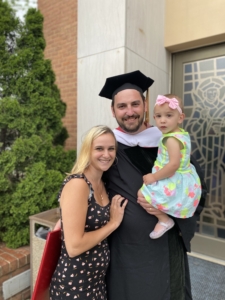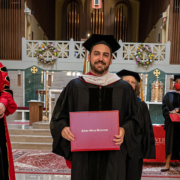Catholic Education Strong ‘Foundation’ for Psychologist
A psychologist who currently works at a veteran’s hospital says that he received a strong “foundation” and “confidence” in his “beliefs and values” through faithful Catholic education.
Dr. Patrick McNeely attended Our Lady Seat of Wisdom College in Barry’s Bay, Ontario, for three years—before the college had received its current degree-granting status. He wrapped up his undergraduate degree at Christendom College in Front Royal, Va., and went on to earn his Psy.D. in Clinical Psychology from Divine Mercy University in Arlington, Va.
Dr. McNeely highly recommends the Catholic liberal arts at the undergraduate level—such as the education provided at Newman Guide colleges—for those who want to be a psychologist.
“While an undergraduate degree in psychology is helpful in some ways, you are going to learn all of that in graduate school,” explained Dr. McNeely. Having a “more rounded understanding of the person that comes from studying philosophy, theology, history, and literature” can help with a “more complete understanding the human person,” he continued.
CNS: Can you tell us about some highlights from your time at Our Lady Seat of Wisdom?
Dr. Patrick McNeely: I would say there were quite a few highlights from my time there. In my first year, I stepped out of my comfort zone and tried out for the school play. While it was definitely not something I had done before, I really enjoyed doing it, and it remains one of the highlights of my first year.
Community-life-wise, I really liked how OLSWC was set up with “dorms” being houses. I think that style really helped to build community at the school. Having a house feel, with common areas and shared kitchens/living rooms/dining rooms, helped to pull students (myself included) out of their cliques and learn to live with and get to know others whom they might not have engaged with as much in a more traditional dorm. OLSWC also put a heavy emphasis on building and fostering community life, which I think was incredibly important and formative for my time there. Whether it was celebrating as a school for different holidays or feast days or having “House Nights,” we were able to really get to know each other in a way that likely would not have happened without the intentional fostering of community that OLSWC emphasized.
Academically, I thoroughly enjoyed pretty much all the classes I took at OLSWC. The teachers were engaging (in and out of classes) and incredibly knowledgeable, and the discussions that took place after classes were a blast. I really enjoyed the philosophy and literature classes that I took. Victorian Literature is probably the class that I look back on and remember the most as being a highlight of my time there. When it comes to “not-top-10” highlights, I would say that putting on ice skates for the first time in 15 years, trying to play hockey, and crashing into the boards in order to stop would have to take the cake. After three years, I finally learned how to stop while on skates without having to ram into the boards.

The McNeely Family
CNS: How did your education help prepare you for your doctoral studies at Divine Mercy University?
Dr. Patrick McNeely: I think it prepared me in three main ways. First, in a very practical way, Divine Mercy University (DMU) has a unique approach to the study of psychology in that they integrate philosophy, theology, and psychology. My time at OLSWC studying the core classes of philosophy and theology helped me to have a much better understanding of the material discussed in class.
Second, I really do believe that the community formation that I received at OLSWC has helped me in the field of psychology. College can often be a time where you go and create new friends, and those are the people that you spend all your time with for the next several years. I think this is especially true of some of the bigger universities where it is virtually impossible to know everyone, and so we stick to our cliques of like-minded/interested people. At OLSWC, the combination of the smaller community and the college’s intentional fostering of community really helped me with my clinical work at DMU. While it seems like an odd thing to say, learning to meet people who are different than you and who don’t have similar interests/beliefs/etc. can be difficult, especially in college. But OLSWC really helped me to learn to branch out and get to know people more, even people I didn’t agree with on most things. I’m not sure if I’m being fully clear on that, but I guess it boils down to OLSWC fostering of social/communal aspects of students helped me to feel more comfortable sitting with clients.
Third, OLSWC’s academics were rigorous and challenging, and I really believe that they helped to prepare me for the difficulty of graduate school. While graduate school is a different kind of difficult, having had the experience of challenging academics in undergraduate school made that transition to graduate academics a little less challenging.
Overall, for those wanting to do graduate studies in psychology, I would highly recommend a liberal arts education. While an undergraduate degree in psychology is helpful in some ways, you are going to learn all of that in graduate school. However, having a more rounded understanding of the human person that comes from studying philosophy, theology, history, literature, etc. can really help to integrate the various psychological theories into a more complete understanding.
CNS: How is your faithful Catholic education influencing your work as a psychologist at a Veteran’s Affairs hospital?
Dr. Patrick McNeely: I think it has helped a lot. I’m not sure that I could draw a straight line from one thing to another, but I have definitely noticed how my view of life has been formed by my education. One specific way that I have noticed the academic influence is from the literature classes that I took while at OLSWC… how the novels and writings from some of the great literary writers of history have given me insight into the human condition and experiences.
Another way that my education has helped is by providing me with a strong foundation and confidence in my beliefs and values. While there can definitely be times when those get challenged or shook from listening to stories and traumas that others have experienced, my education provided me with knowledge about a lot of the questions that come up as well as guidance on where to look to find the answers.
Finally, I think that the community formation that OLSWC provided has really been important in my work. Through my years there, I learned about the importance of being a part of a community and how crucial that can be for flourishing in work and home life.
CNS: Anything else you’d like to add?
Dr. Patrick McNeely: I think I would just say that OLSWC is a unique place. While it does not offer some things that other colleges do (sports teams, large campus, etc.), it does make up for those in different areas. On top of that, the cost to attend (when compared to other Catholic colleges) is much more budget friendly. I very much value my time there, and I am well aware that, if it were not for attending OLSWC (and returning for a 2nd and then 3rd year), I would not be in the place I am today. While there are still many ways for me to learn and grow, I believe that I am in a much better place than I would have been if I had not received the formation and guidance from the faculty, staff, and fellow students at OLSWC.

